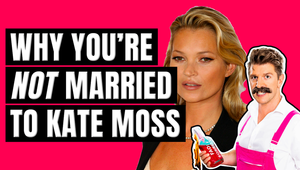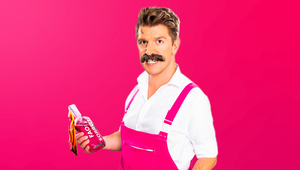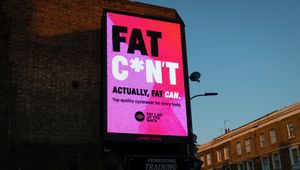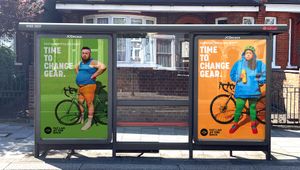
Why Aren’t Your Customers Loyal?

How many people have you had sex with? I bet its loads.
At least a gazillion.
But how many people have you ever loved?... gut wrenching, all consuming, down to your toes kind of love?
One? Maybe two? It's definitely less than five.
This is the same with brands. During your life you'll have fantastic one-night stands.
You might even continue your 'one night stand' dalliance a few times with the same person. But you'll no doubt drift apart, until the next hot sexy replacement comes along.
And yep, it's exactly the same with brands. You'll truly love one, two or maybe a handful of brands in your lifetime. They'll be a big part of your life... Apple iPhone, Nike AirMax, Vodafone mobile phone coverage, Call of Duty video gaming, British Gas (maybe not British Gas).
But it'll be a handful, and the rest were never loved. Instead, they were part of the rich tapestry of life. Which is ok.
So it's kind of weird when brand owners talk about brand love and brand loyalty in these same absolutist terms.
Let's get a few things out in the open, some descriptions of the different phrases.
Brand love. Total horseshit. As I've just illustrated with my very average porn script above. There is no such thing as brand love, especially to the 99.9% of brands out there. Shock horror, your brand isn't Apple, Nike or Vodafone. No matter how significant you think you are, you are insignificant. Teeny tiny.
Lovemarks. Again total BS. The ex-CEO of Saatchi & Saatchi Kevin Roberts in his book Lovemarks, the future beyond brands tried to make the case, for great brands to survive they must create brand love. The public don't give two flying shits about brands, or indeed Kev for that matter.
Brand loyalty. Almost all brands are not loved, we know that. But a select few brands can elicit a pang of loyalty. However, the most important question is; is it monogamous?
And the short answer; no.
Picture the scene. The public buying your product, and then re-buying it handful of times... 'ohhh we've got a keeper!' and the marketing department pop the champagne to celebrate the consummation.
The trouble; that ain't loyalty and that ain't love.
Because the public aren't monogamous.
They're lazy, feckless, illogical, and brilliant.
It would be so much easier if they were monogamous. But they’re not.
They don't care about you, or your brand. They care about the lump in their armpit, Friday night drinks and if the kids will ever shut.the.FUCK.UP.
Let's imagine you love Sainsbury's. Like really love them, your favourite colour is orange… and everything.
You drive to your local Saino's and it's closed. Ergh. Do you drive to the next town 10 miles away to go to Sainsbury's? Because that would be loyal, that’s the type of loyalty you expect from your faithful and loving husband.
Instead, you drive round the corner to Tesco. Why? Because even though you don't get to collect those beautiful nectar points. It’s convenient.
And convenience is the enemy of loyalty... and love for that matter.
Satisfaction and sufficiency, we the public are interested in 'Satisfice'. A theory first established by Herbert A Simon in 1956, and then further developed in his Nobel Prize in Economics speech that same year.
Satisfice is a decision-making strategy or cognitive heuristic, where we search through the available alternatives until an acceptability threshold is met. We, the public, are looking for satisfaction and sufficiency. We aren’t trawling every possible option, creating an excel spreadsheet of every option available to us.
Because we’re lazy, and it’d be exhausting if we had to do that for every single decision, every single day.
So, if a well-established theory like Satisfice is accepted, why do marketers love the idea of brand loyalty?
• Is it because they're stupid? No
• Is it because they love being hugged by strangers? No, well yes, but not this time.
• Is it because if they only have to "fix the leaky bucket" then they don't have to get their hands dirty with the grubbiest part of capitalism, selling. Yes.
So if brand loyalty doesn’t grow a business, then how do brands grow?
Brands grow by acquiring new customers.
Byron Sharp writes at length in his book How Brands Grow. With some incredibly robust data, he proves time and again that brands grow from new customer acquisition. So when the public are walking down the aisle of the supermarket they'll buy "something I've heard of, and can think of easily". Which sounds a long way from loyalty.
His evidence from the Ehrenberg Bass Institute shows that even the most zealot and loyal customers are actually only ‘light customers’. The overwhelming majority of people value convenience.
So when it comes to loyalty, brands don't grow through fixing the leaky bucket, they grow by continually nudging the public with a single message that gets noticed, so when they're walking down the supermarket aisle they buy your brand of vintage inspired tomato juice rather than the competitions.
Why? Because it's something they've heard of and can think of easily.
But that’s all well and good if you're a large brand, a top dog in the category with large budgets.
But most brands are underdogs. For every category top dog there are a dozen underdogs. What happens to them? They get screwed, in fact, they get double-screwed.
The Double Jeopardy Rule... if this was X-Factor there would be mood music to build emotional tension.
Underdog brands are in jeopardy twice because they have less customers and less loyalty.
It’s not because they’re weak or inept, it’s because they’re small. They’re the underdog. They have less physical availability, less incumbent status, less customers. And of the customers they do have, the ones with absolutely no loyalty make up a greater percentage of their overall customer base compared to large brands
So they get kicked between the legs, twice. Yes, capitalism isn’t fair.
But wait, there’s one massive and enduring advantage underdogs can employ. Creativity.
Going where the top dogs can’t, won’t or daren’t go. That’s the biggest competitive advantage an underdog has at their disposal.
In fact, the most recent update to the seminal research from Kantar and Paul Dyson shows other than brand size (being a large incumbent brand), then creativity is the most powerful lever available to an underdog.
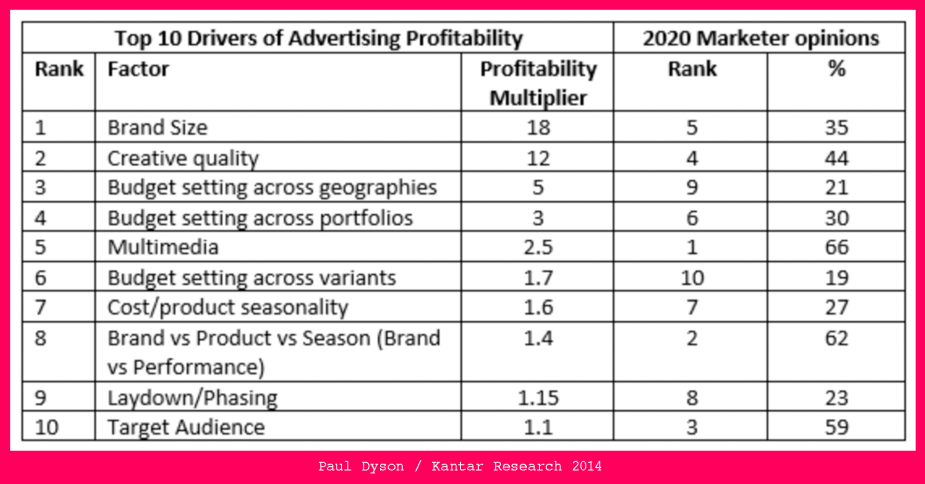
Creativity delivers a 12x multiplier. Wowsers, powerful indeed. Yet strangely it’s ranked by marketers as only the 4th most powerful lever they can pull.
So if the smart brands are ignoring brand loyalty, how do you grow?
Concentrate every fibre, every decision and every move you make on acquiring customers from your competition. And do it with creativity… and a dollop of panache.
Push loyalty, love and being 'the one' to the back of your mind.
Because, whether it's a spotty teenager looking for their first love, or as a veteran Lothario. Profit comes from customer acquisition.
+++
Want more of this rubbish? Every Tuesday at 9am (UK), I explore a topic to help underdog brands grow.
This Tuesday’s topic… YOUR PRODUCT SHOULD BE A NO-BRAINER.
I'll be covering why the best product doesn't always win. And what you can do to change the odds in your favour.
Only 15mins long and you might just learn summat useful. Attend and I’ll see you next Tuesday 😉.









